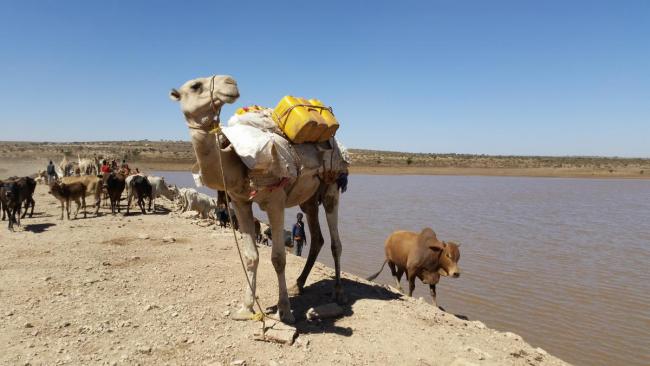Sharing lessons learnt from Somali region around systems thinking in WASH and collaboration between organisations in the humanitarian-development-peace nexus.
Published on: 24/08/2020
Ahead of the World Water Week session ‘’Building Resilient WASH systems in Fragile Contexts: This Decade’s Challenge” presenter and co-convener Roel Blesgraaf of the Netherlands Red Cross is sharing his insights on WASH systems strengthening in Ethiopia.

Somali region, Ethiopia. Photo: Roel Blesgraaf, Netherlands Red Cross
Is it possible for a humanitarian organisation to adopt a systems approach for WASH in disaster-prone areas and amidst chronic crises? I asked myself this after several years of advisory work on water, sanitation and hygiene (WASH) projects in these contexts for the Netherlands Red Cross. Systems thinking for WASH has been receiving ample attention in the last years, for example last December Sanitation and Water for All and the Global WASH Cluster organised a meeting on this topic in Geneva. Still there is a lot to learn about the real-life challenges of adopting systems approaches to WASH in disaster-prone areas or conflict settings. In this blog, I share some of our dilemmas and lessons learnt in Somali region, Ethiopia, as a contribution to the ongoing conversation about systems approaches in WASH and collaboration between organisations in the humanitarian-development-peace nexus.
Somali region in Ethiopia, near the border with Djibouti, Somaliland and Kenya, is characterised by large dry plains and many people living a nomadic lifestyle. The area is vulnerable to several kinds of disasters: it faced severe drought (2017), heavy floods and internal conflict (2018 and 2020) and is now suffering from locust plagues and COVID-19. From 2014 until 2018, the Netherlands Red Cross (NLRC) worked on a Protracted Crisis Programme funded by the Dutch Ministry of Foreign Affairs, together with the Ethiopian Red Cross Society (ERCS), Wetlands International and the Red Cross Red Crescent Climate Centre in Somali region. The project aimed at strengthening the resilience of communities in three areas: food security, water security and Disaster Risk Reduction (DRR). After 2018, NLRC and ERCS continued to work in the same areas on smaller scale WASH projects. As we learnt by doing, and as became clear from the formal evaluations, it hadn’t been easy to work on all elements of the local WASH system (e.g. supporting institutions, regulation and water management) in this context. So, what were the most important challenges and lessons learnt?
The WASH activities in our programme were intrinsically linked to food security, health and DRR. While this holistic resilience approach was commendable, it proved difficult to engage and strengthen all relevant institutions and authorities at municipal, district and state level within the scope of the project. In addition, it was difficult to keep up with the activities of other humanitarian organisations working on the same topics in the region. Lastly, we realised that some of our activities were affected by the local political agenda. There was political pressure from regional level. This required diplomatic skills in addition to technical skills.
The prolonged drought in 2017 in Somali region caused a delay in many project activities. Authorities and organisations involved shifted their focus from a longer-term resilience approach to life-saving activities. Although perfectly understandable from a humanitarian perspective, it interfered with the long-term goals and planning made in our development programme. We learnt how important it is to have timely discussions around these tensions with partner organisations. We also learnt to adopt a monitoring framework that could accommodate a more flexible planning. When funding allows, we try to reserve a significant part of the budget of multi- annual projects in chronic crisis settings for contingency planning. This should allow us to respond quickly to emerging crises such as droughts or COVID-19.
As part of the programme, our partners developed a comprehensive atlas of the area with essential information about ecological and physical conditions (see ‘Atlas of the Upper Fafan Catchment’). Such a strong knowledge base is essential for joint understanding and planning of activities. However, due to the short timeframe of the programme, activities already had to be implemented while the atlas was still being developed. Another challenge was engagement of the local communities in planning and adapting project activities. Although there was an extensive assessment involving local experts before the programme started, involvement of local communities was difficult during later stages of the programme. Contributing factors were among others security, local leadership and sharing of limited resources.
The above-mentioned examples highlight that a systems approach to WASH is certainly valuable, but challenging, in the context of a chronic crisis or in disaster-prone areas. Long-term thinking and working, while still ensuring flexibility, is essential, as well as collaboration between humanitarian and development agencies. But how to stimulate long-term thinking when most humanitarian funding lasts only for one year?
Fortunately, I see some donors understand these challenges and some have already responded to the need of longer-term funding for humanitarian organisations that work in chronic crises. I am happy to see these initiatives and believe systems thinking could help in addressing some of the above challenges. However, we will need more reflection from both development and humanitarian workers, in and outside the WASH sector to understand how to better work together and look for a joint way forward. These reflections should feed into the broader discussion on the humanitarian aid sector’s stalled “localisation” reforms.
At IRC we have strong opinions and we value honest and frank discussion, so you won't be surprised to hear that not all the opinions on this site represent our official policy.